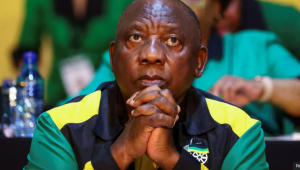South Africa’s President Cyril Ramaphosa is under growing pressure after leading the ruling African National Congress (ANC) to its worst election result in 30 years, forcing it to share power.
With almost all the votes in from Wednesday’s poll, the ANC is on 40% – down from 58% at the previous election.
This is lower than the party’s feared worst-case scenario of 45%, analysts say.
The ANC has always polled above 50% since the country’s first democratic elections in 1994, which saw Nelson Mandela become president.
But support for the party has been dropping significantly because of anger over high levels of corruption, unemployment and crime.
Citing the cost-of-living crisis and frequent power cuts, one woman told the BBC she had voted for the ANC for the past 30 years, but had backed the centre-right Democratic Alliance (DA) this time.
“This result is not good. I wanted it out of government. We need to give someone else a chance,” she said.
At a briefing late on Saturday, electoral commission head Mosotho Moepya said it would be ready to announce the full results on Sunday.
The commission said all objections raised by a number of political parties would be reviewed, and recounts would be ordered if needed.
The BBC understands the final results will be announced at 18:00 local time (17:00 BST).
This is when we will know exactly how many seats each party has in the National Assembly, although South Africa has a strict system of proportional representation, so we already have a pretty
The ANC leadership, including President Ramaphosa, is currently discussing the way forward and preparing for complex coalition talks, a source told the BBC.
Its options are a coalition with the DA, which is in second place on 22%, or the uMkhonto weSizwe (MK) party led by former President Jacob Zuma, on 15%.
The radical Economic Freedom Fighters (EFF) is on 9%, so a coalition of those two parties would fall just short of the required 50%.
The new parliament must be sworn in within two weeks of the final results and the new president would normally be chosen then.
Both the EFF and MK advocate seizing white-owned land and nationalising the country’s mines – policies which would alarm foreign investors.
The MK has said it would be prepared to work with the ANC, but not while it was led by Mr Ramaphosa.
He replaced Mr Zuma as both president and ANC leader following a bitter power struggle in 2018.
MK supporters have been celebrating overnight in Durban, the biggest city in the party’s heartland of KwaZulu-Natal province. The party was only formed in September.
ANC chairperson Gwede Mantashe said his party was unlikely to form an alliance with the DA.
He said there would have to be “policy alignment” between parties to form a coalition agreement.
For the ANC, its black empowerment policies – aimed at giving black people a stake in the economy following their exclusion during the racist apartheid era – were “non-negotiable”.
He added that any coalition partner would have to agree to the National Health Insurance (NHI) Bill, which promises universal healthcare for all, signed into law earlier this month.
The DA opposes both the NHI and the ANC’s black empowerment policies.
Why South Africa’s health insurance is causing ructions
When will we get the results?
Despite the ANC’s reluctance to align with the DA, its leader John Steenhuisen hasn’t ruled out the idea.
But if an alliance with the ANC was reached, there would be a few non-negotiables, he said.
“Respect for the rule of law and the constitution, a social market economy that treats the private sector as partners in the growth agenda.
“Zero tolerance for corruption and cadre deployment, and an absolute laser-like focus on economic policies that grow jobs.”
Mr Steenhuisen also told the BBC he would have to consult pre-election coalition partners before considering any negotiations.
But he ruled out the EFF and the MK party as potential coalition partners.
“I think instability is not in the best interest of the country. A coalition with the radical left in South Africa of the MK party and the EFF will produce the same policies that destroyed
A record 70 parties and 11 independents were running, with South Africans voting for a new parliament and nine provincial legislatures.
The DA has signed a pact with 10 of them, agreeing to form a coalition government if they get enough votes to dislodge the ANC from power.
But this does not include the EFF or MK, who would be needed to form a majority.
As the parties scramble to form alliances, Kenya’s former President Uhuru Kenyatta, who is leading the African Union election observer mission in South Africa, offered some advice for forming coalitions.
He said coalition governments need to focus on areas of agreement instead of differences.
“I can only wish them well and hope that the leadership will take this decision by the people in a positive frame,” he said.
Additional reporting by Nomsa Maseko and Anthony Irungu
BBC

